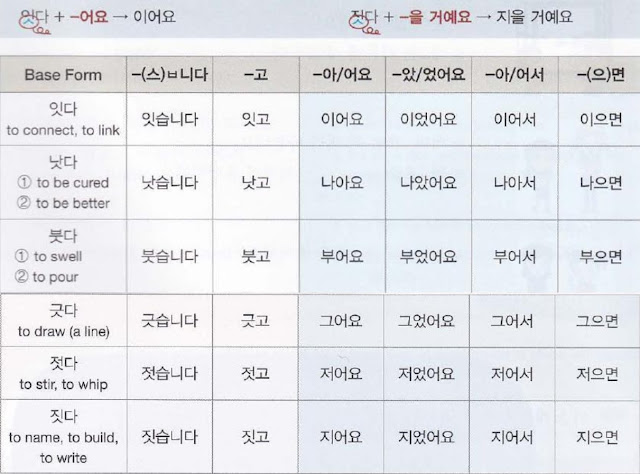![[Korean grammar] ‘ㅅ’ 불규칙 (Irregular Conjugation)](http://sayhikorean.com/wp-content/uploads/2021/10/112.1.jpg) 모기가 물어서 눈이 부었어요.(붓다)
모기가 물어서 눈이 부었어요.(붓다)
A mosquito bit me, so my eye became swollen.
컵에 커피와 크림, 설탕을 넣고 저어요.(젓다)
I put coffee, cream, and sugar in the cup and stir it all together.
어느 옷이 더 나아요? (낫다)
Which outfit is better?
Grammar Focus:
For a few verb and adjective stems that end in ㅅ, ㅅ is omitted when added to an ending that begins with a vowel.
 Although the stems of 벗다 (to take off), 웃다 (to laugh), and 씻다 (to wash) end in ㅅ they are conjugated regularly.
Although the stems of 벗다 (to take off), 웃다 (to laugh), and 씻다 (to wash) end in ㅅ they are conjugated regularly.
 Conversation:
Conversation:
A: 아이 이름을 누가 지었어요?
Who named your child?
B: 할아버지가 지어 주셨어요.
His/ Her grandfather named him/her.
A: 감기 다 나았어요? Did you get over your cold?
B: 네, 이제 괜찮아요. Yes, I’m fine now.
A: 이 단어는 중요하니까 단어 밑에 줄을 그으세요.
This word is important, so please underline it
B: 네. 알겠습니다.
Okay, I will.
In Korean, vowels will often combine when they meet. For example, 배우+어요 combine to become 배워요. However, in the case of irregular ㅅ stems, even though vowels may meet after the ㅅ is deleted, they do not combine.
• 짓다 + -어요 -> 지어요 (〇)/ 져요 (X) (져요 is the combined form of 지다 + -어요.)
• 낫다 + -아요 -> 나아요 (〇) / 나요 (X) (나요 is the combined form of 나다 + -아요.)
>> Full of ‘Korean grammar in use – Beginner’: Click here
>> Fanpage: Say Hi Korean

Thank you for Great korean lession.